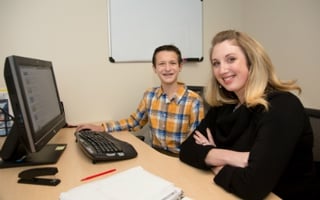For some families, summer school can carry a negative connotation. It can be seen as punishment for...
Helping Students with Professional Performance Goals
Many talented young people who have the opportunity to begin their careers early or to compete at a high level find that their school performance suffers, even though they may be very capable students.
Success in school requires more than just understanding the content. The intense practice schedules for some of our most elite athletes or rehearsals for performers mean that these students do not have the time to complete extensive homework assignments. Many of these high-achieving students must also travel for performances or competitions with little control over the schedule. As a result, their absences may climb beyond an acceptable level. Even though a school may permit more flexibility on the allowable absences, the student is still negatively impacted by missing so much instruction, and the mental and physical demands of their careers may leave them less able to concentrate during the times they are able to attend regularly.
This is a challenge for parents, who worry about the future when school isn’t the top priority and at the same time, want to accommodate their children’s hopes and dreams by taking advantage of unique opportunities that only rarely become available. One to-one schools and schools that implement a mastery-based instruction model allow these students to compress their studies into a shorter time period, enabling them to meet both academic and performance goals.
Unique Challenges for Elite Athletes and Professional Child Performers
Time becomes the greatest limitation for students involved in professional-level activities such as acting, modelling, and other performance mediums outside of school. They cannot change the demands of their out-of-school schedule, which often overlaps with the time they are expected to attend school. Many teachers generously extend due dates or allow students to complete assignments independently. But students sometimes miss instructions, are tired from their other activities, and find it difficult to focus on academics. They can also become depressed if they fall behind, already under pressure to achieve in other areas.
Many students with professional performance goals also struggle socially in traditional schools. They may be absent during the less-structured times of lunch and after school, losing the opportunity to connect with their peers outside of the classroom, and their peers may retreat, feeling intimidated by the high achievement of this group of students.
Some teachers may even be uncharacteristically strict on homework and participation requirements to avoid appearing to favor students who have achieved high levels of recognition outside of school. As a result, many exceptional students receive high praise in the community and the wider world, but feel isolated or bullied at school.
Parents also find themselves swept up in an unfamiliar hectic life. In addition to the uneasy feeling that they are taking a chance on their child’s education, they may also find their own work schedule interrupted. The commitment impacts everyone in the family, and the student, although excited by the opportunities, may feel guilty about disrupting the family routine and question whether the rewards are worth it.
Selecting a Program to Mitigate the Negative Impact of Professional Responsibilities
One top priority is to find a school program that offers flexible scheduling. Being able to shift a school year to accommodate participation in winter sports or to pause a program during highly competitive seasons can allow the student to put forth their best effort for each activity instead of juggling all of them at the same time. Some sports and rehearsal schedules may be accommodated by allowing a late start or early dismissal from school. Regardless of the specific requirements for any particular student, having flexibility with scheduling and attendance requirements is such an important factor that it may turn out to be the only accommodation that is needed to facilitate the student’s success.
A mastery-based learning model is a vehicle for highly-performing students to maximize their time in school and minimize the negative impact of their high-level careers on the rest of the family. This model allows teachers to focus instruction time on areas where students need further instruction and move quickly through concepts they have already mastered, shortening the school day or the school year and thus, freeing up time for other pursuits. Students are able to focus on their own goals without peer comparisons and the social pressures of maintaining status within their cohort because if they need additional time, they can take additional time.
Additional Supports to Consider
Adolescence is a time of many changes, and some teens struggle to control their life. This problem can be exacerbated in situations where students have been groomed from a young age to compete in an area where they have great talent. Without the proper support, students can become overwhelmed and give up on their aspirations or develop related mental and physical conditions related to all of the stress they undergo.
High-performing students often have coaches to assist them with their passions and areas of excessive talent. Having a mentor, tutor, or other caring adult to provide support for academic growth can also be a significant help. This supporting adult can assist with academic goals, and at the same time, help with time management, setting priorities, and many other life and study skills that become even more important when students are living a full and competitive life.
Young students who have the opportunity to advance to a professional level may experience an unexpected level of self-doubt as they grow up more quickly than their peers. They find that their problems and worries are different from those of their peers, and sometimes, like many famous people, they yearn for the opportunity to be a regular person. Working with a counselor, therapist, or social worker can help bridge these feelings of isolation and self-doubt by teaching coping strategies tailored to consider the student’s high level of accomplishment and the very adult demands that are placed upon these students.






